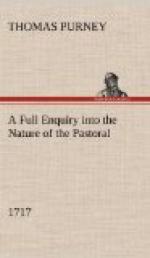Another Observation I shall make, relating to the Manners or Characters in general, is this; and ’tis equally applicable to Epick Poetry, Tragedy, and Pastoral: There are three different ways of drawing Characters; which in Tragedy form the Poem, as ’twere, of three different Kinds or Natures.
The first, and finest is, where the Natural Temper of the Hero’s Mind is drawn in the former Part of the Poem, but after the Peripatie alter’s. As Timon of Athens is drawn at first all free and well-natur’d to a Fault; but after his change of Fortune, is described as a quite different Man; morose, and in hatred with himself and all the World. And so in other Tragedies.
The second Sort is, where the Temper of Mind is the same in the former and latter Part of the Play; but all along forced from it’s Natural Bent. Every where inclin’d and leaning to a different Temper; yet is no where wholly carry’d off, or alter’d, as in Venice-Preserv’d; Jaffeir’s Temper is generous, faithful, and tender, but thro’ Want and Enticement being drawn into a Conspiracy, this Temper is half effac’d in him: But the Strugglings which the Poet has so fine an Opportunity of describing, between his present Actions and his natural Temper, are carry’d thro’ the whole Piece; and he condemn’s himself the same for ungenerously betraying his Friend at the End, as for entring into the Conspiracy against his Country, at the beginning of the Play.
The last kind of Character is, where the Natural Temper of the Mind is neither drawn in the latter Part of the Poem; nor retain’d thro’ the whole, but clouded and broken; but instead thereof some casual and accidental Humour, which from some Misfortune, or the like, has quite changed the Natural Temper before the Person appear’s on the Stage, or in the Poem. As in the Distress’d-Mother, the Character that give’s name to the Tragedy, is all along in Tears and Grief for Hector; and what her Temper was before his Death, does not appear, that is, what her Natural Temper was.
I need not detain you to apply what I have here observ’d to Pastoral in particular; ’tis enough to affirm, that the Method which appears most beautiful in Tragedy, will be equally finest in Pastoral Poetry.
CHAP. II.
What Condition of Life our Shepherds should be supposed in. And whether the Golden-Age, or the present state of the Country should be drawn.




